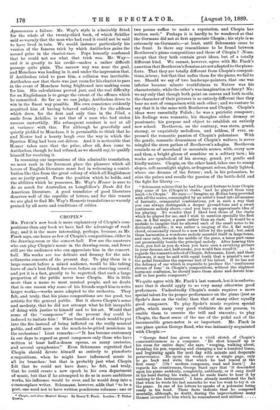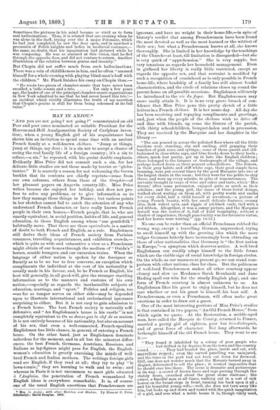CHOPLY.* - Ma. FINCK'S new book is more explanatory of
Chopin's com- positions than any book we have had the advantage of read- ing; and it is the more interesting, perhaps, because, as Mr. Finck says, one hears so few of Chopin's compositions, either in the drawing-room or the concert-hall. Few are the amateurs who can play Chopin's music in the drawing-room, and fewer still are the audiences who can appreciate him in the concert- hall. His works are too delicate and dreamy for the mis- cellanedus concerts of the present day. To play them in a large concert before a mixed audience, would be like taking leave of one's best friend, for ever, before an observing crowd; and yet it is a fact, greatly to be regretted, that such a large proportion of the public never hear Chopin. His is little more than a name to most musical people, and no doubt that is one reason why some of his friends urged him to write larger works,—works more adapted to the orchestra. They felt, and truly, that his piano compositions are too good, too artistic for the general public. But it shows Chopin's sense and modesty, that he did not attempt what he felt incapable of doing with justice to himself and to his art. Would that some of the " composers " of the present day could be induced to imitate him ! What bundles of trash would be put into the fire instead of being inflicted on the really musical public, and still more on the much-to-be-pitied musicians in the orchestras ! Liszt remarks :—" It has become customary in our days to regard as great composers only those who have written at least half-a-dozen operas, as many oratorios, and several symphonies." Even Schumann regretted that Chopin should devote himself so entirely to pianoforte compositions, when he might have influenced music in all its branches f but that is probably just what Chopin felt that he could not have done; he felt, and truly, that he could create a new epoch in his own department of music, but that if he attempted to do so in more ambitious works, his influence would be over, and he would drop into a commonplace writer. Schumann, however, adds that "to be a poet, one need not to have written ponderous volumes : one or
• Chopin, and other Musical Essays. By Henry T. Tina. London : T. Mellor lJnwin.
two poems suffice to make a reputation, and Chopin has written such." Perhaps it is hardly to be wondered at that the Germans did not at first appreciate Chopin ; his style is so extremely un-Germanic,—at least, until Schumann came to the front. Is there any resemblance to be found between Beethoven's piano compositions and those of Chopin ? .None, except that they both contain great ideas, but of a totally different kind. We cannot, however, agree with Mr. Finck's assertion that Beethoven's Sonatas are not adapted to the piano- forte. That they are totally different from Chopin's composi- tions, is true; but that that unfits them for the piano, we fail to see. Should we say of two landscape-painters, that one was inferior because minute truthfulness to Nature was his characteristic, while the other's was imagination or fancy P No; we say only that though both paint on canvas and both in oils, the character of their pictures is so entirely different that they bear no sort of comparison with each other ; and we venture to say that it is the same with Beethoven and Chopin. Chopin's ideas were essentially Polish ; he was a patriotic composer ; his feelings were romantic, his thoughts either dreamy or passionate, his purpose and object to establish an entirely new school. Beethoven, on the contrary, was stern, grand, stormy, or exquisitely, melodious, and seldom, if ever, ex- pressed the romantic passion of Chopin's polonaises. With the gentle, romantic dreaminess of Chopin's waltzes, is never mingled the stern pathos of Beethoven's adagios. Beethoven reminds us of moorland or mountain scenes, with, every now and then, a bright gleam of sunshine on a solitary tarn ; his works are symbolical of his stormy, grand, yet gentle and kindly nature. Chopin, on the other hand, takes one to sunny slopes, soft moonlight nights, or fragrant salons, dimly lighted, where one dreams of the future ; and, in his polonaises, he stirs the pulses and recalls the passion of the battle-field and the fight for liberty :—
"Schumann relates that he had the good fortune to hear Chopin play some of his (Chopin's) etudes, and he played them very much a is Chopin.' He says Imagine an /Soli= harp provided with all the scales, commingled by an artist's hand into all manner of fantastic, ornamental combinations, yet in such a way that you can always distinguish. a deeper ground-tone and a sweet continuous melody above,—and you have an approximate idea of his playiug. No wonder that I liked best those of the etudes which he played for me, and I wish to mention specially the first one, in A flat major, a poem rather than an etude. It would be a mistake to imagine that he allowed each of the small notes to be distinctly audible ; it was rather a surging of the A fiat major chord, occasionally raised to a new billow by the pedal ; but, amid these harmonies, a wondrous melody asserted itself in large tones, and once only, towards the middle of the piece, a tenor part came out prominently beside the principal melody. After hearing this etude, you feel as you do when you have seen a ravishing picture in your dreams, and, half-awake, you would fain recall it.'. . . . As regards the romantic school of Chopin, Schumann, Liszt, and their followers, it may be said with equal truth that a pianist's use of the pedal furnishes the supreme test of his talent. If he has not the delicacy of ear which is requisite to produce the continuous stream of tone' in Chopin's compositions, without the slightest harmonic confusion, he should leave them alone and devote him- self to less poetic composers."
We quite agree with Mr. Finck's last remark, but it is unfortu- nate that it should apply to so very many otherwise good performers. Undoubtedly Chopin's music requires a more special talent for its proper performance on the piano (just as Spohr's does on the violin) than that of many other equally
good composers. To play Spohr's music requires special gifts, which many very good violinists do not possess, to enable them to execute the trill and staccato ; to play Chopin, the finest sense of the use of the pedal and of the innumerable grace-notes is as important. Mr. Flick in one place quotes George Sand, who was intimately acquainted with Chopin :—
" George Sand has given us a vivid sketch of Chopin's conscientiousness as a composer. He shut himself up in his room for entire days,' she says, weeping, walking about, breaking his pen, repeating and changing a bar a hundred times, and beginning again the next day with minute and desperate perseverance. He spent six weeks over a single page, only to go back and write that which he had traced at the first essay.' [Oh ! modern composers, read and learn!] As regards his creativeness, George Sand says that it descended upon his piano suddenly, completely, sublimely, or it sang itself in his head during his walks, and he made haste to hear it by rushing to the instrument.' I have already mentioned the Tact that when he wrote his last mazurka he was too weak to try it on the piano. In one of his letters he speaks of a polonaise being ready in his head. These facts indicate that he composed mentally, although, no doubt, during the improvisations many themes occurred to him which he remembered and utilised
Sometimes the pictures in his mind became so vivid as to form real hallucinations. Thus, it is related that one evening when he was alone in the dart, trying over the A major Polonaise, which he had just completed, he saw the door open, and in marched a procession of Polish knights and ladies in medireval costumes,— the same, no doubt, that his imagination had pictured while he was composing. He was so alarmed at this vision, that he fled through the opposite door, and did not venture to return. Another illustration of the relation between genius and insanity."
But Chopin did not suffer much from such hallucinations. There was a vein of childlikeness in him, and he often "amused himself for a whole evening with playing blind-man's-buff with the children." Mr. Finck finishes his essay on Chopin thus :— " He wrote two pieces of chamber-music that have never been
excelled, a 'cello sonata and a trio Yet only a few years ago, the leader of one of the principal chamber-music organisations in New York admitted to me that he had never heard this trio!— an incident which vividly illustrates the truth of my assertion that Chopin's genius is still far from being esteemed at its full value."



































 Previous page
Previous page